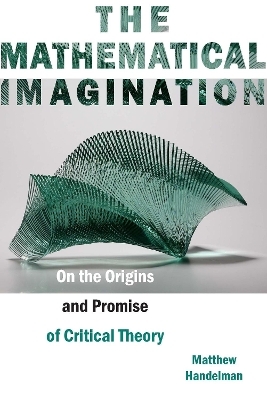
The Mathematical Imagination
On the Origins and Promise of Critical Theory
Seiten
2019
Fordham University Press (Verlag)
978-0-8232-8383-5 (ISBN)
Fordham University Press (Verlag)
978-0-8232-8383-5 (ISBN)
This book offers an archeology of the undeveloped potential of mathematics for critical theory. As Max Horkheimer and Theodor W. Adorno first conceived of the critical project in the 1930s, critical theory steadfastly opposed the mathematization of thought. Mathematics flattened thought into a dangerous positivism that led reason to the barbarism of World War II. The Mathematical Imagination challenges this narrative, showing how for other German-Jewish thinkers, such as Gershom Scholem, Franz Rosenzweig, and Siegfried Kracauer, mathematics offered metaphors to negotiate the crises of modernity during the Weimar Republic. Influential theories of poetry, messianism, and cultural critique, Handelman shows, borrowed from the philosophy of mathematics, infinitesimal calculus, and geometry in order to refashion cultural and aesthetic discourse.
Drawn to the austerity and muteness of mathematics, these friends and forerunners of the Frankfurt School found in mathematical approaches to negativity strategies to capture the marginalized experiences and perspectives of Jews in Germany. Their vocabulary, in which theory could be both mathematical and critical, is missing from the intellectual history of critical theory, whether in the work of second generation critical theorists such as Jürgen Habermas or in contemporary critiques of technology. The Mathematical Imagination shows how Scholem, Rosenzweig, and Kracauer’s engagement with mathematics uncovers a more capacious vision of the critical project, one with tools that can help us intervene in our digital and increasingly mathematical present.
The Mathematical Imagination is available from the publisher on an open-access basis.
Drawn to the austerity and muteness of mathematics, these friends and forerunners of the Frankfurt School found in mathematical approaches to negativity strategies to capture the marginalized experiences and perspectives of Jews in Germany. Their vocabulary, in which theory could be both mathematical and critical, is missing from the intellectual history of critical theory, whether in the work of second generation critical theorists such as Jürgen Habermas or in contemporary critiques of technology. The Mathematical Imagination shows how Scholem, Rosenzweig, and Kracauer’s engagement with mathematics uncovers a more capacious vision of the critical project, one with tools that can help us intervene in our digital and increasingly mathematical present.
The Mathematical Imagination is available from the publisher on an open-access basis.
Matthew Handelman is Assistant Professor of German Studies at Michigan State University.
Introduction: The Problem of Mathematics in Critical Theory, 1
1. The Trouble with Logical Positivism: Max Horkheimer, Theodor W. Adorno,
and the Origins of Critical Theory, 25
2. The Philosophy of Mathematics: Privation and Representation in
Gershom Scholem’s Negative Aesthetics, 65
3. Infinitesimal Calculus: Subjectivity, Motion, and Franz Rosenzweig’s Messianism, 104
4. Geometry: Projection and Space in Siegfried Kracauer’s Aesthetics of Theory, 145
Conclusion: Who’s Afraid of Mathematics? Critical Theory in the Digital Age, 187
Acknowledgments 201
Notes 205
Bibliography 245
Index 269
| Erscheinungsdatum | 12.02.2019 |
|---|---|
| Zusatzinfo | 6 |
| Verlagsort | New York |
| Sprache | englisch |
| Maße | 152 x 229 mm |
| Themenwelt | Geisteswissenschaften ► Philosophie ► Philosophie der Neuzeit |
| Geisteswissenschaften ► Sprach- / Literaturwissenschaft ► Anglistik / Amerikanistik | |
| Geisteswissenschaften ► Sprach- / Literaturwissenschaft ► Literaturwissenschaft | |
| Sozialwissenschaften ► Soziologie ► Spezielle Soziologien | |
| ISBN-10 | 0-8232-8383-6 / 0823283836 |
| ISBN-13 | 978-0-8232-8383-5 / 9780823283835 |
| Zustand | Neuware |
| Haben Sie eine Frage zum Produkt? |
Mehr entdecken
aus dem Bereich
aus dem Bereich


